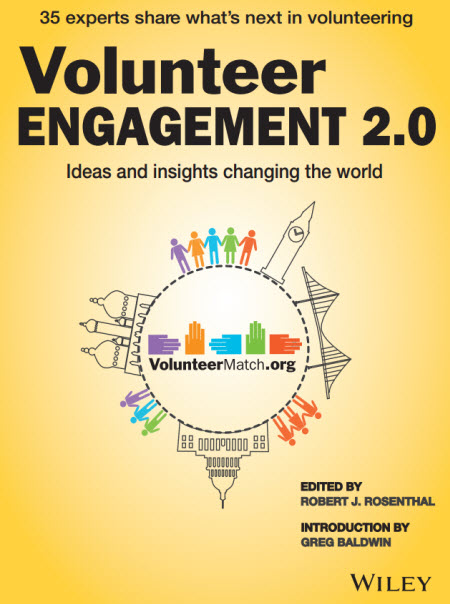 In May 2015, the book Volunteer Engagement 2.0 will be published by Wiley. The brainchild of VolunteerMatch, the book is meant to be a “what’s next” regarding volunteering, and features 35 different chapter contributors, including me.
In May 2015, the book Volunteer Engagement 2.0 will be published by Wiley. The brainchild of VolunteerMatch, the book is meant to be a “what’s next” regarding volunteering, and features 35 different chapter contributors, including me.
I was asked to contribute a chapter on virtual volunteering and, initially, I said no. I said no at first for two reasons:
- Because, as Susan Ellis and I note in The LAST Virtual Volunteering Guidebook, virtual volunteering should not be a separate topic amid discussions about volunteer engagement and management. Instead, virtual volunteering needs to be fully integrated into all such discussions and trainings. No more segregation at the end of the book or workshop! If a book talks about recruiting volunteers, for instance, it needs to include how the Internet plays a role in this. If a workshop explores ways to recognize volunteers, it needs to include how to leverage online tools for this.
- Because virtual volunteering is NOT “what’s next” in volunteering: it is NOW. It’s a practice that’s more than 30-years-old. There were already so many organizations involving online volunteers back in the late 1990s I quit trying to count them!
I ultimately agreed, instead, to write a chapter on what I think is “what’s next” regarding virtual volunteering. And, as usual, I went against the grain: while everyone seems to be saying that microvolunteering is what most volunteers really want, I think there are a growing number of people that, instead, want more meaningful, high-responsibility, high-impact roles in virtual volunteering.
I focused my chapter on direct service virtual volunteering. Using a variety of asynchronous and synchronous Internet tools, this type of virtual volunteering includes:
- Electronic visiting with someone who is home-bound, in a hospital or assisted living facility
- Online mentoring and instruction, such as helping young students with homework questions or supporting adults learning a skill or finding a job
- Teaching people to use a particular technology tool
- One counseling by volunteers, such as staffing online crisis support lines
- Facilitating online discussion groups for people with specific questions or needs, on childcare, organic gardening, travel to a particular area, or most any subject humans are capable of discussion
- Offering legal, medical, business, or other expertise to clients
- Working on a project together with clients and other volunteers as a part of meeting the organization’s mission, such as writing about the news of their neighborhood, school, or special interest group
When volunteers interact with clients directly, it’s a highly personal activity, no matter the mission of the organization. These volunteer roles involve building and maintaining trust and cultivating relationships – not just getting a task done. It takes many hours and a real commitment – it can’t be done just when the volunteer might have some extra time. And altogether, that means that, unlike microvolunteering, these direct service virtual volunteering roles aren’t available to absolutely anyone with a networked device, Internet access and a good heart. These roles discriminate: if you don’t have the skills and the time, you don’t get to do them. And, believe it or not, the very high bar for participation is very appealing to a growing number of people that want to volunteer.
Of course, I’m not opposed to microvolunteering – online tasks that take just a few minutes or hours for a volunteer to complete, require little or not training of the online volunteer, and require no ongoing commitment. I’ve been writing about microvolunteering before it was called that – I gave it the name byte-sized volunteering back in the 1990s, but the name didn’t stick. I think, if you want to give lots of people a taste of your organization or program, with an eye to cultivating those people into longer-term volunteers, and/or donors, and you have the time to create microvolunteering assignments, great, go for it!
But I am hearing and seeing a growing number of comments from people, especially young people, saying they want more than just a “quickie” volunteering experience. They want more than number-of-hours volunteering. They want more than a list of tasks that need done. They want something high-impact. They want to feel like they have really made a difference. They want to make a real connection with the organization and those, or the mission, it serves. They want a deep volunteering experience. I fear that, in the rush to embrace the microvolunteering buzz, we’re ignoring those people that want something more. My chapter in Volunteer Engagement 2.0 is my plea to not ignore those potential volunteers.
 How to create both online microvolunteering tasks and high-responsibility online roles, including direct service with clients, and everything in between, as well as how to recruit and support volunteers for those roles, is fully explored, in great detail and with a lot of examples, in The LAST Virtual Volunteering Guidebook.
How to create both online microvolunteering tasks and high-responsibility online roles, including direct service with clients, and everything in between, as well as how to recruit and support volunteers for those roles, is fully explored, in great detail and with a lot of examples, in The LAST Virtual Volunteering Guidebook.


